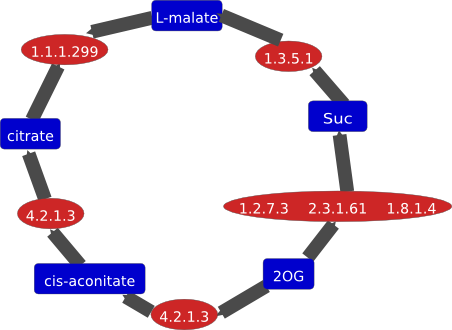EC Number   |
Application   |
Reference   |
|---|
    5.3.99.2 5.3.99.2 | analysis |
particle concentration fluorescence immunoassay for prostaglandin D synthase is suitable for determining the content of prostaglandin D synthetase in various regions of the rat CNS. The method allows to assay a large number of samples with reasonable sensitivity |
3109 |
    5.3.99.2 5.3.99.2 | analysis |
PGD synthase is a useful marker for identifying the differentiation stage of human megakaryocytic cells |
3110 |
    5.3.99.2 5.3.99.2 | medicine |
apoptosis induced by chemotherapeutics paclitaxel, cisplatin and 5-fluorouracil is prevented by siRNA targeting lipocalin-type prostaglandin synthase-D |
694489 |
    5.3.99.2 5.3.99.2 | medicine |
based on the observations it is speculated that PGD2 acts as one of the immuno-modulating molecules in gastric mucosa infected with Helicobacter pylori, PGD2 might be involved in the pathophysiology of other gastric diseases, such as gastric ulcers or erosion |
705307 |
    5.3.99.2 5.3.99.2 | medicine |
both hematopoietic- and lipocalin-type prostaglandin-D synthase are present in cartilage from healthy donors as well as from patients with osteoarthritits. Level of lipocalin-type prostaglandin-D synthase is more than 20fold higher than hematopoietic-type enzyme. Levels of lipocalin-type prostaglandin-D synthase mRNA and protein are increased in cartilage from aptients with osteoarthritis. Treatment of chondrocytes with IL-1beta upregulates lipocalin-type prostaglandin-D synthase mRNA and protein expressions as well as prostaglandin D2 production in a dose- and time-dependent manner. The upregulation of lipocalin-type prostaglandin-D synthase by IL-1beta is blocked by the translational inhibitor cycloheximide. Specific inhibitors of the MAPK p38 and c-jun N-terminal kinase and of the NF-kappaB and Notch signalling pathways suppress IL-1beta-induced upregulation of lipocalin-type prostaglandin-D synthase expression. An inhibitor of the extracellular signal-regulated kinase ERK/MAPK demonstrates no significant influence. Prostaglandin D2 prevents IL-1beta-induced upregulation of lipocalin-type prostaglandin-D synthase expression |
690665 |
    5.3.99.2 5.3.99.2 | medicine |
dendritic cells in the epidermis and dermis are capable of functioning as an important source of PGD2 in the skin, thereby contributing to or regulating innate and/or acquired immune responses of the skin |
701618 |
    5.3.99.2 5.3.99.2 | medicine |
elevated enzyme levels in the cervicovaginal secretions of women are a potential biomarker for preterm birth |
749210 |
    5.3.99.2 5.3.99.2 | medicine |
enzyme mRNA is up-regulated in mouse model of globoid cell leukodystrophy or Krabbes disease, of Tay-Sachs disease, Sandhoff disease, GM1 gangliosidosis and Niemann-Pick type C1 disease,. Oligodendrocytes of all these mouse models show strong immunoreactivity for enzyme, but not astrocytes or microglia |
681535 |
    5.3.99.2 5.3.99.2 | medicine |
hematopoietic prostaglandin D2 synthase derived prostaglandins may protect against inflammatory diseases, where T-lymphocytes play a pathogenic role, as in rheumatoid arthritis, atopic eczema, and chronic rejection |
682532 |
    5.3.99.2 5.3.99.2 | medicine |
hematopoitic prostaglandin synthase controls an inhibitory effect on intestinal tumours |
679038 |





